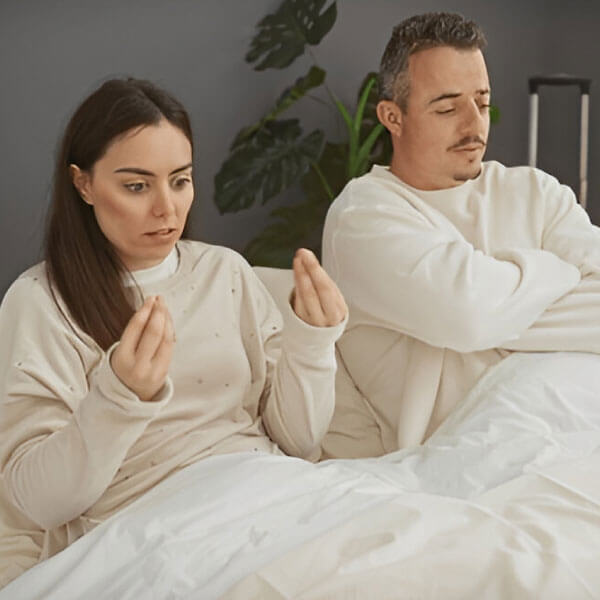
Dyspareunia is the medical term for pain during or after sexual activity. The pain can be sharp or mild and can affect your ability to enjoy intimacy. Visit our DOXXES store on North Freeway / Little York for support tools and expert guidance to help improve comfort and confidence.
What Is Dyspareunia?
Dyspareunia means ongoing or repeated pain in the genitals during sex. It may happen at the start, during, or after intercourse. The pain can feel shallow near the vaginal entrance or deep in the pelvis. Some people feel pain only with certain positions or movements.
Why Does Dyspareunia Happen?
Emotional factors include:
- Stress, fear, or pressure to perform
- Past trauma or history of abuse
- Worry about pregnancy or STIs
- Low self-esteem or depression
Physical factors include:
- Vaginal dryness or infections (like yeast or STIs)
- Hormonal shifts from menopause or birth control
- Tight pelvic floor muscles or past surgeries
- Conditions like fibroids or endometriosis
These causes can often overlap. For example, stress may tighten muscles, making physical pain worse.
Real-Life Examples and Common Triggers
Examples:
- Marie feels cramping and lower stomach pain after sex.
- John experiences a burning sensation and can’t sit comfortably afterward.
- Lisa asks, “Why am I cramping after sex?” after trying a new position.
- Peter notices sharp pain after using a new toy or position for the first time.
To find triggers:
- Keep a journal tracking what causes or worsens pain
- Note which positions, moods, or products were involved
- Try changes like longer foreplay or different lubricants
Who Is Affected by Dyspareunia?
Dyspareunia can affect anyone—regardless of gender or age. It impacts self-esteem, intimacy, and emotional closeness.
- Women may feel pelvic or abdominal pain after sex, especially during hormonal changes
- Men, non-binary, and trans individuals may feel pain from tight pelvic muscles or prostate-related issues
How a Sex Therapist Can Help
A therapist can:
- Help identify emotional or physical causes of pain
- Offer stress-reduction techniques to relax the body
- Guide you and your partner in healthy communication
- Support healing from past trauma that may affect intimacy
Treatment and Coping Strategies
Medical and Emotional Support:
- Talk therapy to ease anxiety and boost confidence
- Pelvic floor physical therapy if muscles are too tight
- Medications or hormone therapy for dryness or inflammation
- Couple’s therapy to rebuild trust and communication

How DOXXES Can Help
At DOXXES, we offer products that support healing and reduce pain:
- Water-based lubricants for sensitive skin
- Pelvic floor trainers to strengthen and relax tight muscles
- Gentle vibrators to help with desensitization
- Prostate massagers with clear safety instructions
Our products come with step-by-step guides. Pairing these tools with therapy and medical care often speeds recovery.
How to Talk About It
- Be open: “I feel worried because sex hurts.”
- Use “I” statements to avoid blame
- Choose a quiet time to talk without stress
- Learn together—explore trusted sources as a couple
- Ask a professional for help if pain or frustration continues
Visit DOXXES on North Freeway / Little York
Stop by our store for discreet, friendly service. Our staff will help you choose the right products and offer advice in a respectful, nonjudgmental way.
Conclusion
You don’t have to live with pain during sex. Dyspareunia is treatable with the right mix of medical support, emotional care, and gentle tools. Visit DOXXES on North Freeway / Little York to get started on your journey to pain-free intimacy.
FAQs
- What is dyspareunia?
It means ongoing pain during or after sexual activity. - Can I get tested for painful sex at your North Freeway location?
Yes. We offer exams, imaging, and care plans tailored to your needs. - What causes it?
Causes include dryness, infections, muscle tension, endometriosis, or past trauma. - Can emotional stress cause pain during sex?
Yes. Anxiety and stress can make your muscles tense and lower arousal. - What treatments are available at DOXXES?
We offer lubricants, pelvic therapy tools, and referrals to health professionals. - Is painful sex common after menopause?
Yes, but it’s treatable. Hormonal changes often affect lubrication and tissue elasticity. - Can men have dyspareunia?
Yes. Men may feel pain from infections, tight muscles, or prostate issues. - Should I avoid sex if it hurts?
Yes—take a break until the cause is found and treated. - Are Kegels always helpful?
Not always. If your muscles are too tight, relaxation techniques may work better. - Does therapy help?
Yes. It’s especially helpful when pain is linked to stress, trauma, or emotional issues.
